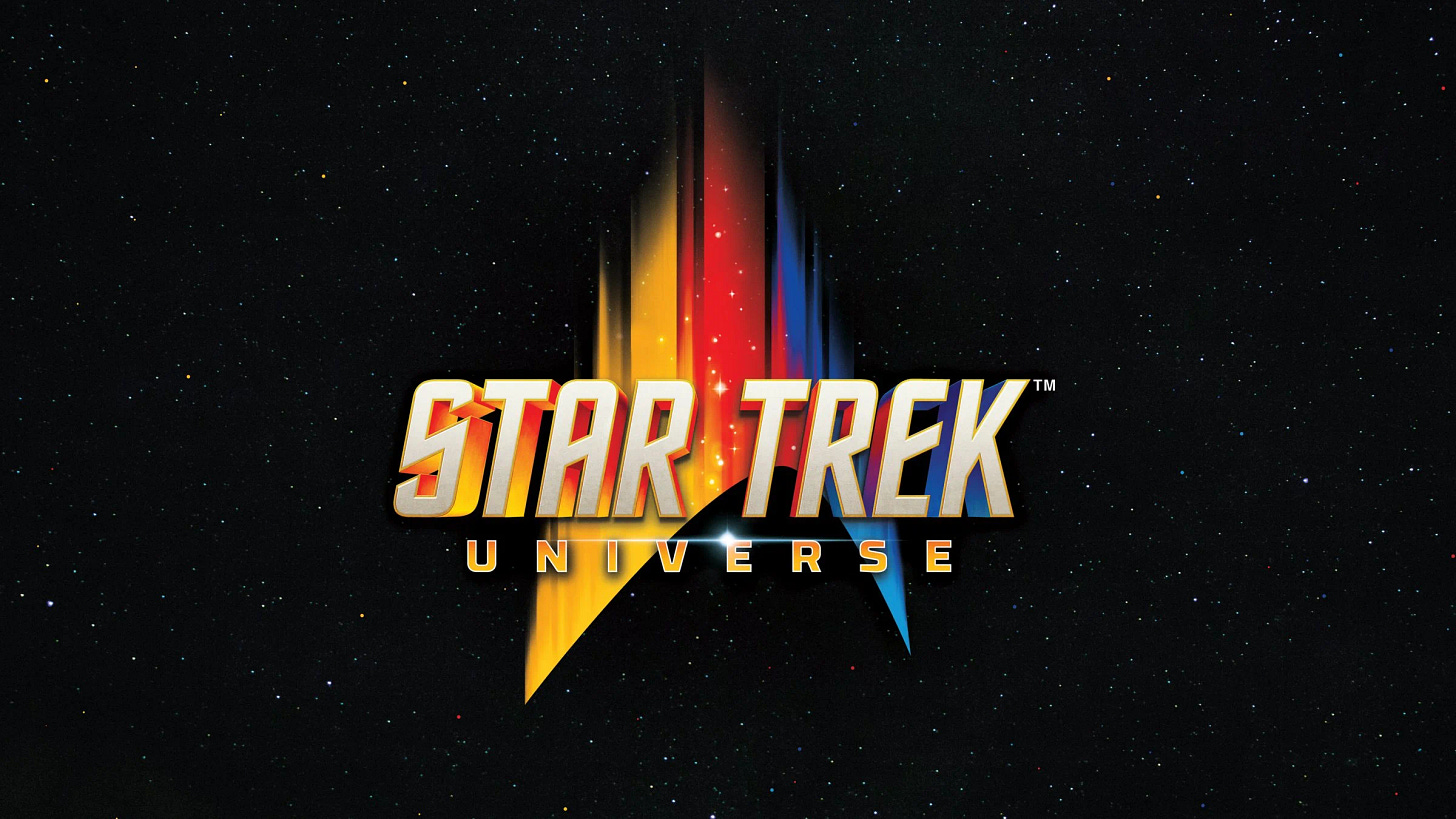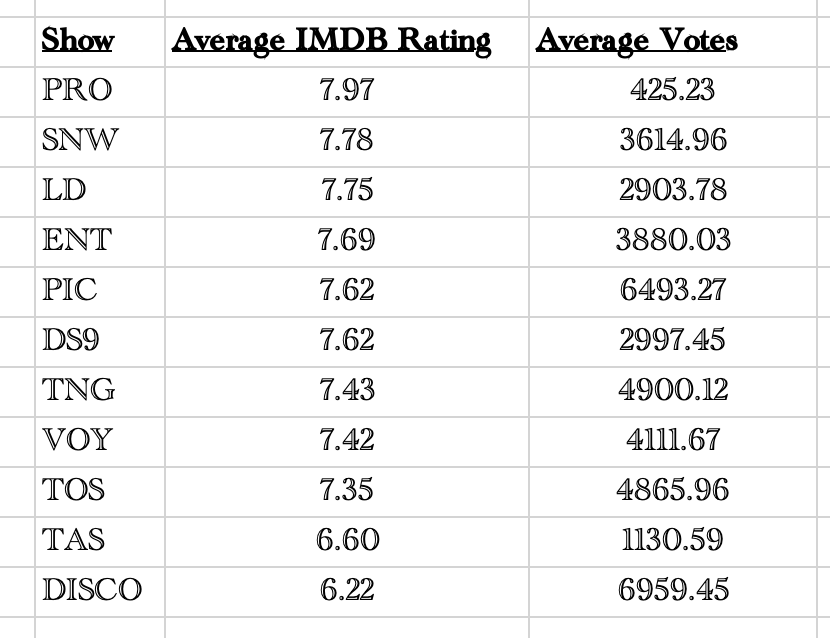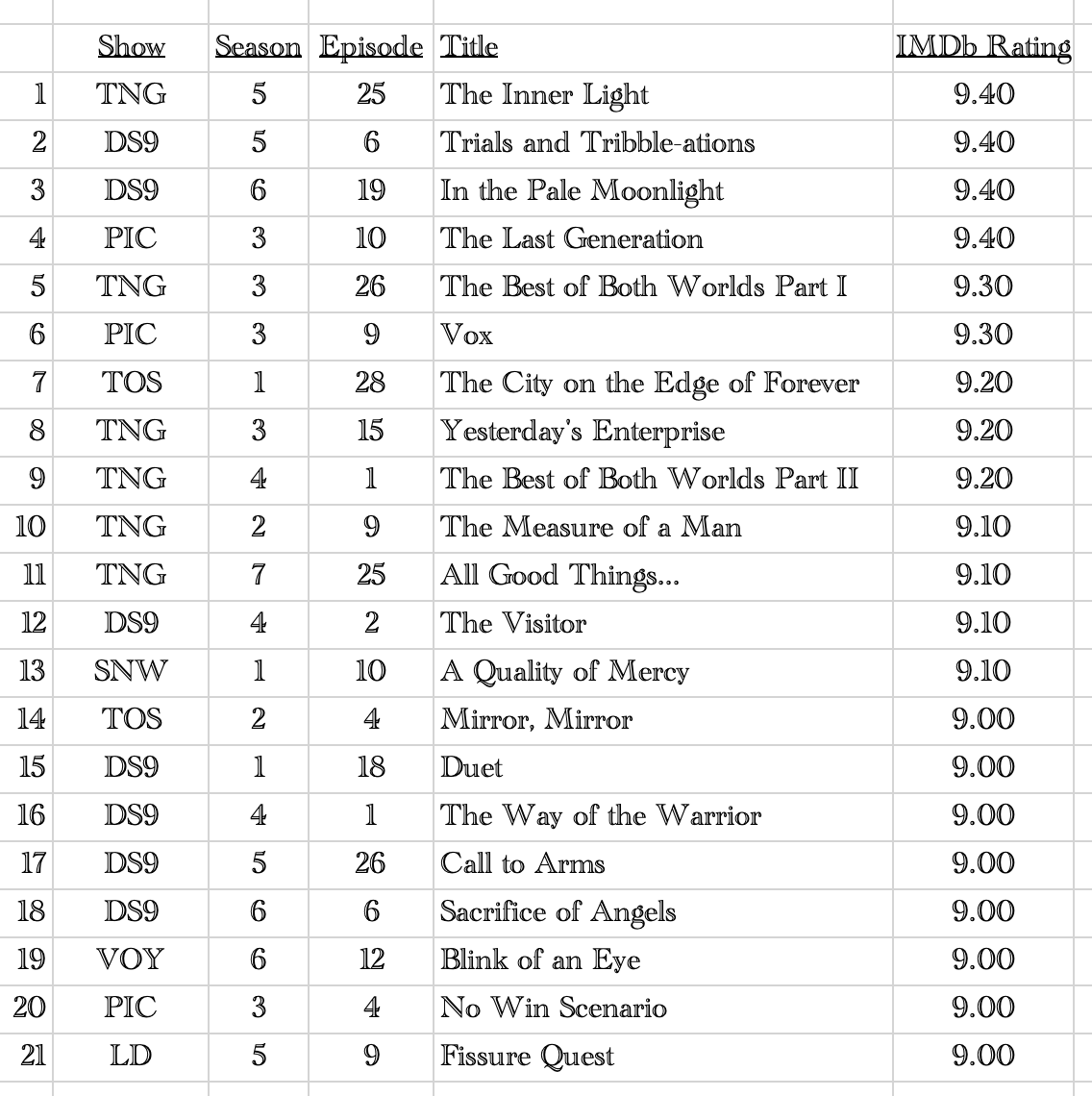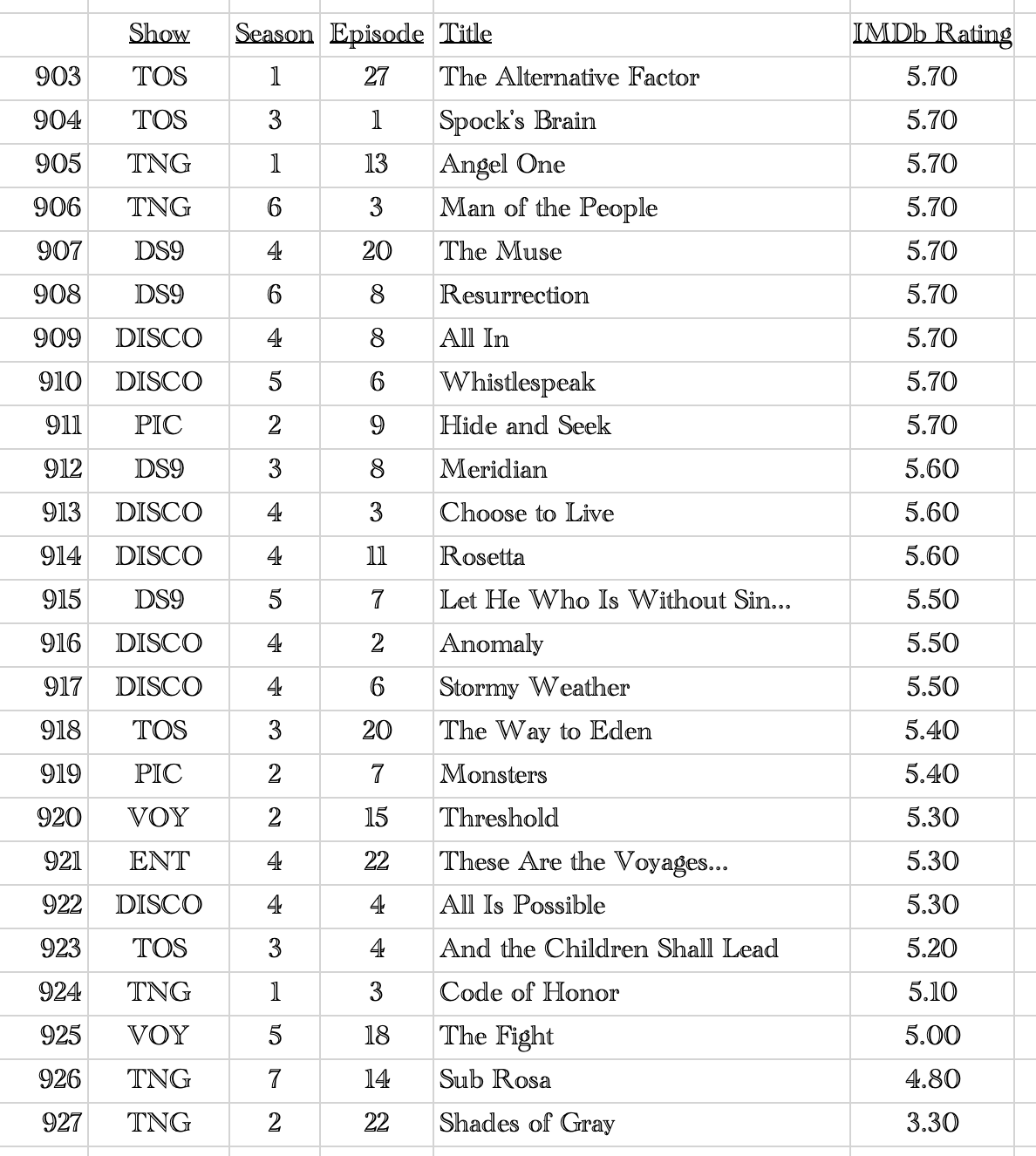A Geek Does a Nerdy Thing (or a Nerd Does a Geeky Thing)
It gets so hard to keep track...
So, I would start by noting that my partner in Ancient Geekery, Tom Grant, has started this Substack with a number of well-written, thoughtful essays. I was hoping to start off by contributing the same. Instead, I went down a bit of a rabbit hole. I have been thinking quite a lot about the convergence of fandom, nostalgia, fanservice, and quality, and it made me think about what kinds of objective (or, at least, semi-objective and intra-comparable) metrics I could deploy in such a conversation.
Old Trek, New Trek, Good Trek, Bad Trek?
I had an inkling of an idea to write about the question of prequels as well as the issue of what I see as the inevitability of self-reference and some degree of retconning in any fictional universe that persists for decades. I was also thinking about the degree to which it seems that fans of newer entries of a given fictional universe can often react quite negatively to additions to a given franchise. Indeed, if one is Very Online, one might think that no likes new Star Trek, new Doctor Who, new Star Wars, or new anything!
I, of course, exaggerate, but the negative comments are not hard to find.
For context, I will note that I am ancient enough geek for “new” Star Trek to mean reruns of The Animated Series with any hope for new live-action Trek to feel like a fantasy. As such, I have long found myself predisposed to cherish new entries when they have come, even when they have not always fully met my expectations.
I have a lot to say about the franchise, each series, and the state of current Trek, I will leave that all for future essays. Instead, let’s talk about the nerdy and/or geeky thing I ended up diverting myself with.
Nobody Expected This to be About AI!
So, I began to wonder how much the online discourse about new Star Trek actually comported with some kind of metric, and my mind turned to the ratings given per episode to shows on IMDb. I recognize that these are unscientific samples, but given the open access to the platform, there are certainly ample chances for positive and negative feedback to be expressed. Moreover, I would subjectively state that I find IMDb ratings to come fairly close to my own subjective tastes. The only show that I can think of wherein this was not the case is Zero Day, Robert De Niro’s Netflix political thriller. It has an overall 7.0 ranking, and I would put it at a 6.0 at best, and only then because the cast was good enough to get me to keep watching.
But I digress.
I got curious about IMDb ratings for Trek episodes and thought about maybe doing a limited comparison, but the Political Scientist in me wanted a more comprehensive approach. This then became an experiment with AI chatbots. While I have had some limited exposure to ChatGPT, I have not tried to use any of these tools for an actual project. To my delight, AI tools easily made spreadsheets for me, pulling in the episode information into CSV format in mere minutes. The work would have taken me hours upon hours to compile manually. I experimented with Copilot, ChatGPT, and Grok. Grok proved the best for this task.
However, it is not perfect, despite the relatively straightforward assignment, often pulling the wrong IMDb rating for a given episode. In a few very limited cases, it made errors in the episode titles. As such, I did manually check the ratings, which did make all of this take longer than intended.
The blogger in me hates to waste a lot of prep work, so this essay exists. Content must be created!
Note: since IMDb ratings are open, these numbers could change over time, so that which is shared below is anchored to the 8/19/25-8/20/25 timeframe.
The Most Popular Star Trek Series Is…
I looked at 11 Star Trek TV series: Star Trek (TOS), Star Trek: The Animated Series (TAS), Star Trek: The Next Generation (TNG), Star Trek: Deep Space 9 (DS9), Star Trek: Voyager (VOY), Star Trek: Enterprise (ENT), Star Trek: Discovery (DISCO), Star Trek: Picard (PIC), Star Trek: Lower Decks (LD), Star Trek: Prodigy (PRO), and Star Trek: Strange New Worlds (SNW). (This leaves out Short Treks and Very Short Treks).
My guess was, going into this exercise, that TNG would be the most popular, with DS9 and TOS in the upper tier.
Nope!
To my surprise, as per IMDb users, Prodigy is the highest rated (although note the right-hand column: it has the fewest average votes per episode by far, meaning it is clearly the least watched of the shows, which stands to reason). I will note that I did not do anything more than a small spot check of the vote totals. The rankings for every episode I confirmed are accurate, barring my own possible errors (of which I found one already!). I did not do so for the vote totals, so in regard to the right-hand column, it is a case of in Grok we trust (well, kinda).
Setting aside Prodigy, it is still noteworthy that SNW and Lower Decks are the next two, followed by Enterprise and Picard! (I would have guessed ENT to be towards the very bottom).
As such, prequels (SNW and ENT do quite well), as does most new Trek (PRO, SNW, LD, and PIC), which rates better than any 90s Trek. This despite the fact that there is a lot of online griping about prequels and about new Trek in general.
Granted, the range from TOS to PRO is 7.35 to 7.97, or 0.62 points. Not exactly a massive gap! Still, to read all the grievances online about Kurtzman Trek and such, one would have expected TNG, DS9, and VOY to be at the top by a mile!
Now, it is noteworthy, although not surprising, that DISCO is in last place. That was roughly where I would have thought it would be (and is in my own personal ranking). And I say that as someone who didn’t dislike Discovery, and was especially fond of season two. Still, the show had some problems that perhaps one day I will more fully muse about.
I would also note that the number of average rankings per episode is quite high (higher than I expected) for DISCO and PIC.
This doesn’t really prove anything, as much as it provides some level of sanity, in my view, to what is often a fraught online conversation. These are at least similar metrics with the same access to fans and haters across all of these shows.
I will say that while I did not do a comprehensive analysis, some of the seasons in newer Trek were amongst the least popular and show some real variation.
PIC, S1 7.57
PIC, S2 6.63
PIC, S3 8.67
It is noteworthy that PIC, s3 was the TNG reunion season. Nostalgia sells (although there was quite a lot of nostalgia in S2 that didn’t quite sell as well). This is a point I will come back to below (and future entries, no doubt).
DISCO, s4, had an average score of 5.8
At any rate, the rating above may suggest that if you haven’t watched Prodigy, maybe you should. It is probably as close to a sequel to Voyager as we are going to get (certainly more than we will ever get for DS9).
Forget Series, What About Episodes?
There are, according to my spreadsheet, 927 episodes across all 11 series listed above. The average rating across all 927 is a 7.39. Not bad! And again, my personal subjective relationship to IMDb ratings is that the numbers do tend to correlate with the quality of the programming. If a show has consistent 8s in the mix, it is almost certainly good, and if it has a lot of 6s or worse, it probably isn’t worth my time. So, a franchise that averages over a large N a 7.39 is probably pretty damn good overall.
The Top of the Class
Here are the twenty-one episodes with a 9.0 or higher IMDb rating. (BTW, I realize that if I wanted to be more accurate, I would have grouped the ranking based on tied ratings, but I didn’t have the energy to be that pedantic nor did it occur to me to try and use AI to do so—as such, each tier, i,.e., the 9.4s, are listed chronologically and does not suggest that The Inner Light is better than In the Pale Moonlight).
Here, we get closer to what I would have expected, with 90s Trek dominating: seven from DS9, six from TNG, followed by three from PIC, two from TOS, and one each from VOY, LD, and SNW.
Note that all three PIC episodes were from the TNG reunion season, making 17 of the 21 either from the 90s era or starring 90s era crews. Here we return to my point about nostalgia and its power, especially given that it seems noteworthy that the one SNW episode in the list is a timey-wimey version of a classic TOS episode, Balance of Terror, which has an 8.8 rating. Likewise, DS9’s Trials and Tribble-ations is a sequel of sorts (parallequel?) of a classic TOS episode, The Trouble with Tribbles, with an 8.7 rating.
To add one more data point, the top-rated Lower Decks episode, Fissure Quest, contains a cavalcade of multiversal versions of past Trek characters: T’Pol, Bashir, Garak, Curzon Dax, and a passel of Kims.
It should be noted that nostalgia alone is not enough to result in top ratings. Voyager’s Sulu episode, Flashback, is rated 7.7, which is the same rating as TNG’s Scotty episode, Relics. As such, nostalgia alone is not enough to propel an episode to the top of the list. Quality of the story also matters.
Other examples: TNG’s Sarek rates an 8.1. The two TNG Spock episodes (the two-part Unification) rate 8.2 and 8.3, respectively.
Shades of Spock’s Gray Matter
Here are the bottom 25 episodes (5.7 rating or lower).
Here, DISCO is the leader in the clubhouse with seven, almost all from the aforementioned and poorly rated s4. Next is TNG with five, TOS and DS9 with four each, two each for PIC and VOY, and 1 for ENT.
One of the most shocking findings here is that DS9’s Move Along Home was not in the 5.7 or lower club, scoring a 5.8! Allamaraine!
BTW, the prominent roles of Riker and Troi were not even to save ENT’s finale, These Are the Voyages…. Indeed, their presence was seen as a huge problem, proving that nostalgia alone isn’t enough to fuel a warp reaction.
Ok, So What?
I am actually intrigued by the possibility of AI tools to aid some basic kinds of research, as pulling data into a spreadsheet for analysis would be useful in some political science research. But it is also disappointing that it needs as much babysitting as it does.
Oh, you mean about Star Trek?
While a lot of this is just a silly exercise, it has taught me a couple of things.
First, despite a lot of griping online, there are also a lot of people who like new Star Trek. Again, IMDb is not a scientific sample, but it is a prominent enough site that this evidence smooths out the noise we may get from social media and other online discourse on the topic of new vs. old Trek.
Second, it is interesting to note the degree to which nostalgia and self-reference play, and do not play, in the popularity of some of these episodes. There is nothing dispositive here, to be clear. But perhaps there are some threads here of use for future discussion.
Third, it is actually pretty striking how well Trek, as a whole, rates. A 7.39 average episode rating is pretty impressive over 11 series and closing in on 1,000 episodes!







For me, Star Trek has always been a bit of cheesy, even as a young sci-fi/fantasy nerd. I admit the reason why I watched as a child was because of Spock. Nowadays, only a few episodes would stand on their own. The same with TNG, not all Captain Picard episodes are great. Of the new series, Lower Decks and Strange New Worlds have provided the freshest revival to the brand known as "Star Trek."
I am not enough of a ST fan to have much to say about this other than: Good work!
I will note that I am not surprised that that particular episode of DS9 rates so highly, though it is a bit odd that it rates higher than TOS's "The Trouble With Tribbles"